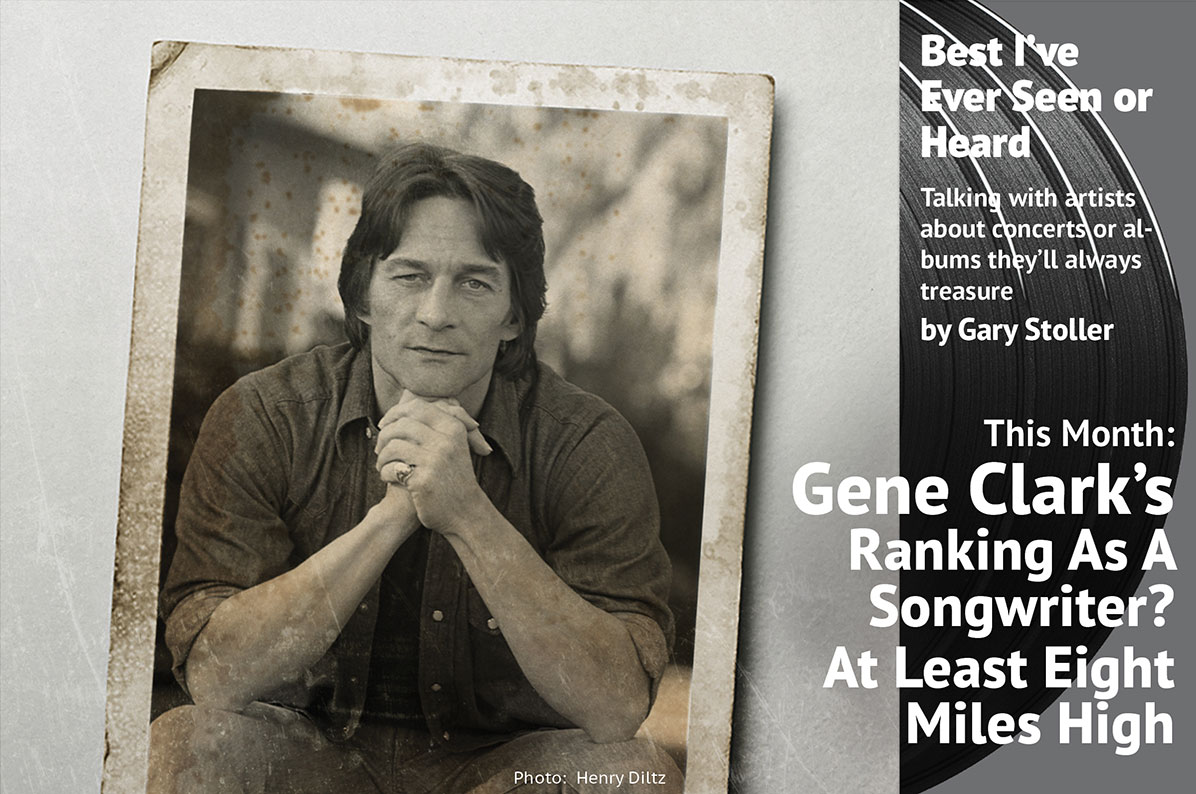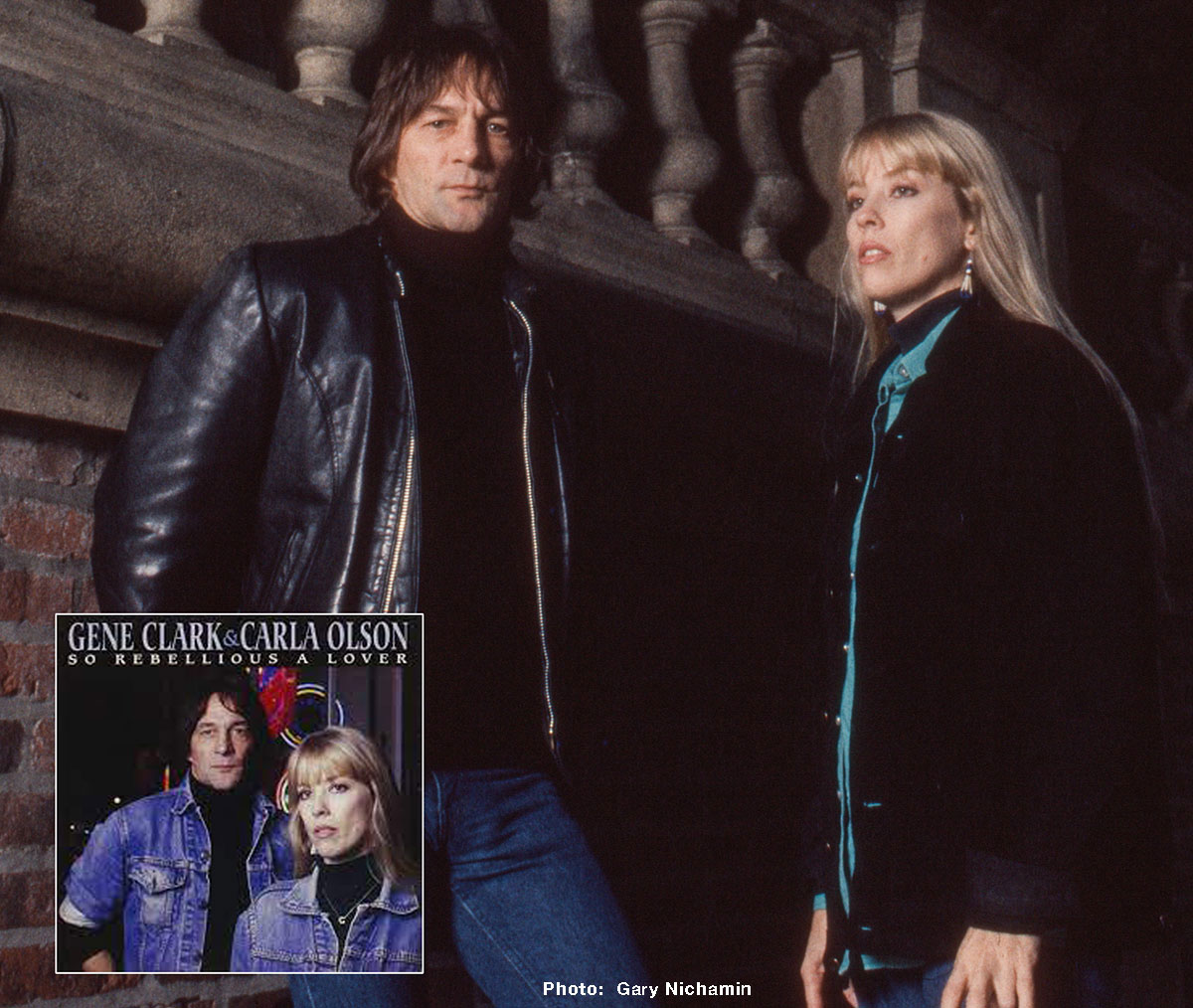
With more than 600 songs in his catalog and the recipient of a 2016 Nobel Prize for Literature, few can argue that Bob Dylan is the greatest American songwriter among performing rock/pop/folk/country musicians. But who in the annals stands behind him in the No. 2 and No. 3 positions?
Might it be Carole King or Paul Simon, two brilliant songwriters who each have written hundreds of songs? Let me throw in another worthy name that few people know: Gene Clark.
I have been a big fan of Clark’s songs for many years, but I was floored by a new triple album Gene Clark Collected, released by Universal Music, a label in the Netherlands. It contains 60 songs, and the sheer number of incredible songs in one package made me truly appreciate the magnificence and historic importance of Clark’s work.
The album includes Clark’s songs as a founding member of the Byrds, others with the Gosdin Brothers, the Dillards, McGuinn, Clark & Hillman and Carla Olson, and, most importantly, his phenomenal compositions as a solo artist. Clark has 199 songs that he wrote or cowrote registered with BMI, America’s largest music rights organization, and Clark historians say he recorded or wrote 60-200 more that weren’t registered.
“I believe my father should at least be in the Top 5 of greatest songwriters of all time,” Kai Clark, Gene’s son, tells me. “He has been passed up many times as an inductee into the Songwriters Hall of Fame, which boggles my mind! Justin Timberlake has been inducted! Ugh.”
Kai, a musician and a graduate of the California Culinary Academy, only saw his dad perform twice — two shows in April 1991 at the Cinegrill, a restaurant and nightclub in Hollywood, California. Kai was 17, and his dad died at age 46 a month later. Two years ago, Kai released a tribute album, Silver Raven, containing 11 Gene Clark songs.
Family ties to his father, Kai says, are not the reason he believes Gene was one of rock’s greatest songwriters.
“I don’t just say that because I am his son,” Kai explains. “I say that because I truly feel that way as someone who plays music and writes songs. His writing style was quite unique and distinctive. His vocal ability was something that cannot be recreated or copied and still amazes me every time I hear his singing voice.
“I know how hard he worked at being his own thing and not emulating other singers and songwriters,” Kai continues. “If he had achieved more success and recognition for his solo career outside of his time with the Byrds, he would surely be recognized as one of the greatest songwriters the world has ever known. Who knows? Maybe one day he will be recognized as just that!”
John Einarson, the author of Mr. Tambourine Man, The Life and Legacy of the Byrds’ Gene Clark, muses about Clark’s standing as a songwriter.
“Was Gene as prolific as Carole King or Paul Simon?” Einarson responds in answer to my question. “That’s a tough call. There may even be others, like Neil Young, whose sheer volume of songs written is impressive. For me, regarding Gene Clark’s oeuvre, though, it’s never been about quantity but quality. Gene’s quality of songwriting always remained impressive and never wavered over time.
“Much of his songwriting has a timeless quality to it that doesn’t go in or out of popular favor,” adds Einarson, whose 339-page book provides innumerable details about Clark’s life and music. “That may also be the reason why his music continues to resonate with newer generations — that timeless quality. He wrote from the heart and didn’t curry commercial appeal for its own sake. Despite failing to achieve the commercial success he enjoyed in the Byrds, Gene’s songwriting remained stellar, and that makes his post-Byrds recordings well-worth seeking out as well as adding to the melancholy surrounding his career. He remained a contender throughout his short life.”
Clark was “truly one of the greats,” says Marco Witkamp, the project manager who supervised the Gene Clark Collected release. “Not only was he the main songwriter for the Byrds when they first started out, his songs have been praised for decades and covered by such artists as Tom Petty, Robert Plant, Iain Matthews, Dan Fogelberg, Yo La Tengo, This Mortal Coil and Jakob Dylan. Depeche Mode’s Dave Gahan recorded a version of ‘Where My Love Lies Asleep’ on his 2021 album Imposter. And just listen to some of Clark’s great originals like ‘For a Spanish Guitar,’ ‘1975’ or ‘Life’s Greatest Fool.’ It really doesn’t get much better than that.”
Besides ‘For a Spanish Guitar’ and ‘Life’s Greatest Fool,’ Witkamp’s favorite Clark song is “She Don’t Care About Time,” the B side of the Byrds’1965 hit single “Turn! Turn! Turn!, which reached No. 1 on the Billboard chart. “But ask me again tomorrow,” Witkamp says, “and I might give you three different songs.”
Kai Clark says it’s almost impossible to choose Gene’s best song, because he wrote so many great ones.
“Many songs he wrote touch on different genres of music — country, folk, rock, psychedelic rock, folk rock, alternative country and more,” Kai says. “To compare them in the same category seems to defeat their standing or contribution to that genre. Picking a favorite song also depends on an individual’s taste in music. Personally, I am fond of his ballads, such as ‘Your Fire Burning’ and ‘Gypsy Rider,’ which highlight his amazing vocal ability. But, if you ask me to pick one song based on its impact to music and the public in general, I would have to say ‘Eight Miles High,’ followed closely by ‘No Other.’
Mr. Tambourine Man, the Byrds’1965 debut album, is the first Byrds album Kai owned and still his favorite album by the groundbreaking group. The album was a worldwide smash, transforming Bob Dylan’s cutting-edge folk music into rock and roll and paving the way for the Byrds’ later reputation as inventors of folk-rock, country rock and psychedelic rock. Gene Clark was the Byrds’ principal songwriter on the album, writing three songs and co-writing two others with Roger McGuinn. The remaining songs were covers.
“Each song is so amazing and reflects the very height of what the Byrds were capable of during their short time together,” Kai says.
Gene Clark with the Gosdin Brothers is Kai’s favorite of Gene’s solo albums. Released a year after Clark left the Byrds, players on the album included the Byrds’ Chris Hillman and Michael Clarke, Clarence White, Doug Dillard and the Gosdin Brothers. Critics have said the songs are folk-rock and country-rock masterpieces, and they’re on an album that pre-dates the Byrds’ Sweetheart of the Rodeo, which is often credited with inventing the country-rock genre.
“Every song on the album is a hit song in my eyes,” Kai says. “The music on that record is still relevant today and could fit right in with today’s radio-play rotation. I can listen to that album over and over and never get tired of it.”
I mention to Kai that my favorite Gene Clark album is Roadmaster, a 1973 record released in the Netherlands. Kai agrees that it’s a great album, and I take the kudos further: one of the Top 5 or Top 10 albums in rock/folk/country history. The songs flow effortlessly with a simple elegance and probably — yes, arguably — Gene’s most beautiful vocal performance.
What drove him to become such an outstanding songwriter?
“I believe my father was fascinated by what he heard coming out of the radio as a young man and inspired by the artists of the time who were pushing the boundaries of what was considered acceptable in the music industry,” Kai says. “I feel he had big dreams at a young age about being part of something that was new and exciting. My grandfather played music, so my father was exposed at a young age to the guitar. Like most young men, he looked up to his father, and that may have had some impact on his choice to pursue a musical career. Mainly, he had a God-given natural talent and desire to express his feelings and emotions through writing songs and playing music.”

Musically, it’s not easy, Kai says, to live up to his father’s legacy. He says he has no such desire.
“I am not my father, and I never will be,” he explains. “I have resemblances and parts of my father that come through me in my music, and I embrace those things as a gift. I enjoy playing his music and released a tribute album Silver Raven dedicated to him and his career. The album includes some of my father’s past musical comrades, including Carla Olson, Byron Berline and Henry Diltz.”
Unfortunately, the COVID-19 pandemic struck, so “we were never able to have a release party or tour to support the album, though it has received great reviews worldwide,” Kai says. “I am currently working on an album of original songs and feel these songs are a reflection of what I have always wanted to do with my music. Many songs are reminiscent of Dillard and Clark and stir up feelings of country and bluegrass music mixed with my rock and roll background.”
Living up to Gene Clark’s legacy might be impossible for any songwriter.
“Gene has been variously described as a hillbilly Shakespeare, psychedelic Johnny Cash, cocaine-fueled visionary and tragic figure,” Einerson writes in his book Mr. Tambourine Man. “He was none of these. Gene was a man of simple virtues, hard work and integrity — deeply soulful and sincere. He was born with a gift for poetry in lyric, and he dedicated his short life to that gift.”
